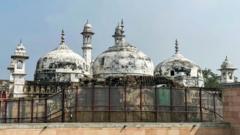The ongoing Supreme Court hearings related to India's 1991 Places of Worship Act could determine the trajectory of religious disputes in the country. Critics argue that any alteration of the law may lead to widespread unrest, while supporters maintain its importance in protecting minority religious sites.
India's Places of Worship Law Faces Supreme Court Challenge Amidst Tensions

India's Places of Worship Law Faces Supreme Court Challenge Amidst Tensions
The Supreme Court of India is deliberating on a contentious 1991 law that protects the character of religious sites, as Hindu-Muslim tensions rise.
India is on the brink of a significant legal and cultural turning point as the Supreme Court reviews several petitions challenging the Places of Worship Act of 1991. This controversial legislation was enacted to maintain the character and identity of places of worship as they existed on the eve of India’s independence in 1947. The Act prohibits any alteration to these sites and prevents judicial intervention in disputes regarding their status, excluding the controversial Babri Masjid case.
The Babri Masjid, a 16th-century mosque, has long been a focal point of Hindu-Muslim animosity. It was demolished in 1992 by a Hindu mob, which led to widespread riots across the nation that left hundreds dead. A landmark ruling by the Supreme Court in 2019 resolved the Babri Masjid dispute in favor of Hindu groups, reigniting fervent discussions about India's religious dynamics.
Current petitions, notably supported by members of Prime Minister Narendra Modi's Bharatiya Janata Party (BJP), argue that the 1991 law undermines religious freedom and constitutional secularism. In contrast, opponents, including various Muslim organizations and political leaders, assert that the law is crucial for preserving minority religious sites in a predominantly Hindu nation. They warn that invalidating or weakening the law could trigger a wave of similar challenges and escalate existing tensions, especially between Hindu and Muslim communities.
On Thursday, the Supreme Court took precautionary action, barring lower courts from accepting new cases related to the ownership of religious places until further notice. This temporary freeze underscores the significance of the law, as countless mosques face challenges from Hindu groups, who assert that many were built on the ruins of Hindu temples. The next hearing on this critical issue is scheduled for February.
The Places of Worship Act was introduced during a time of heightened tensions surrounding the dispute over the Babri Masjid, which gave rise to violent clashes and societal unrest. It was part of an effort to quell rising intolerance and prevent further strife among India's diverse religious population. However, the law has also drawn criticism, particularly from the BJP, who argued it catered to minority appeasement and risked deepening the divide between Hindu and Muslim communities.
Despite the Act’s intentions, several recent court cases have reignited hostilities, including a notable petition challenging the historical significance of the Ajmer Sharif dargah, a revered Sufi shrine. Additionally, violent clashes erupted in Sambhal after a court approved a survey of a 16th-century mosque, reflecting the real-world implications of these legal disputes.
As India grapples with these challenges, the evolving circumstances surrounding the Places of Worship Act will play a vital role in shaping the country's religious landscape. The Supreme Court's upcoming decisions are being closely monitored, as they hold the potential to either calm or exacerbate the ongoing religious tensions within the nation.




















